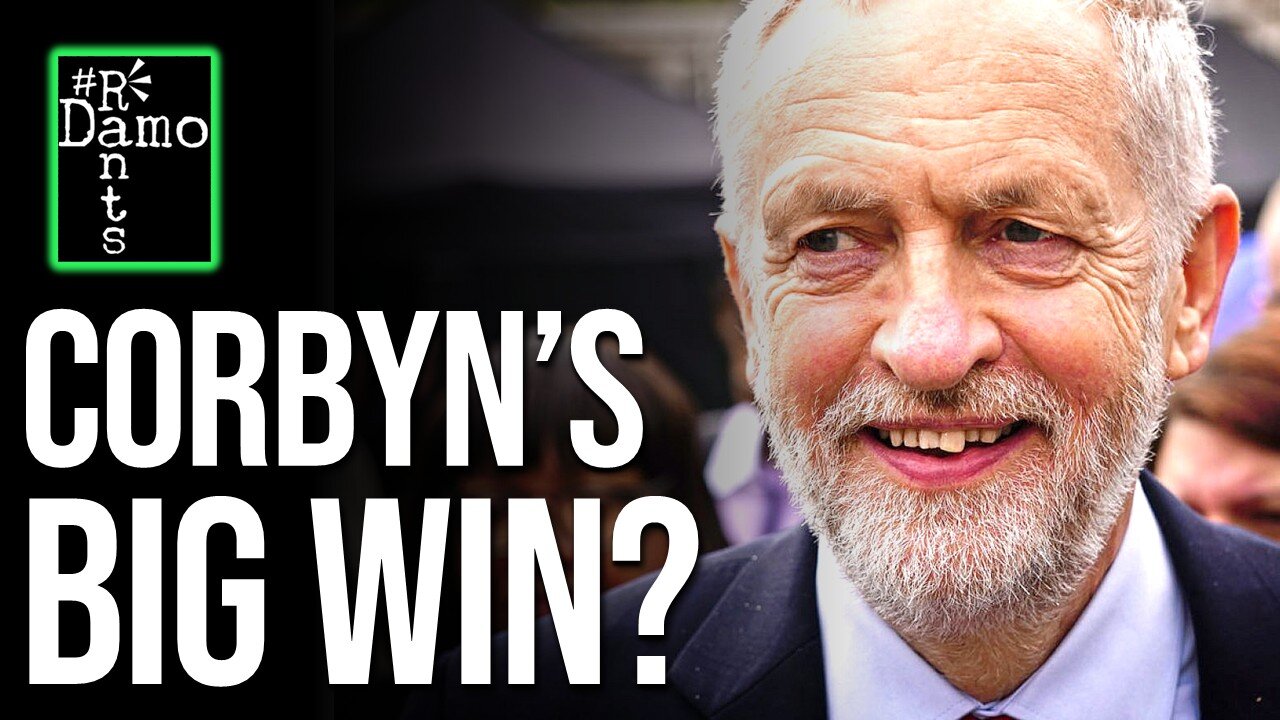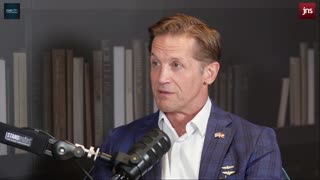Premium Only Content

Starmer’s Grip On Unions Weakens — And Corbyn Stands To Win Big
Right, so it takes a special kind of masochism to keep paying someone who openly despises you, but that is precisely what Britain’s biggest trade unions are doing with Keir Starmer’s Labour Party isn’t it? Unite alone has funnelled more than £100 million into Labour since its creation, only to be rewarded with a leader who brands his party as “the party of work” — code for bosses, donors, and careerists, not the workers who founded it. This is not pragmatism, it is political self-harm. Labour was born to be the voice of the trade union movement; today, it sneers at its own parent while pocketing the cash. The tragedy is obvious, but the comedy is darker: the very institutions created to give Labour life are now subsidising their own irrelevance. Starmer doesn’t even pretend to care about union influence, brushing off their motions at conference and outlawing their solidarity with Palestine, while Sharon Graham and other union leaders dutifully play along with that. If unions exist to defend working people, why are they still footing the bill for a party intent on erasing them from history? And more to the point — how much longer will their members tolerate paying for their own betrayal? Well moves are now afoot within Unite to cut ties with labour and form them with Jeremy Corbyn’s new party instead, but with a leader like Sharon Graham who has taken stands against Corbyn, is it even possible to address Labour affiliation, without addressing union leadership first?
Right, so Unite, one of Britain’s largest trade unions and Labour’s biggest donor certainly, now finds itself at a bit of a crossroads and its taken us long enough to get there, this is my trade union as it happens, everyone should belong to one no matter what they do. Created in part to give birth to the Labour Party over a century ago, it has poured more than £100 million into Labour since its formation in 2007 according to Electoral Commission data. Yet under Keir Starmer, Labour is no longer the party of workers at all, but as he now brands it, “the party of work” — a party of bosses, donors, and foreign lobbyists. So the very movement Labour was created to serve is today funding its own marginalisation therefore. Labour is no longer cast as the party of workers, in or out of employment, united by shared class interests. It is rebranded as the party of “work” itself, elevating employment into a moral obligation and excluding those who are unemployed, on benefits, disabled, or otherwise outside the labour market and we’ve seen that reflected in recent Labour policy of course, attacks on benefits and on the disabled. Labour’s discourse now praises “contribution” and “responsibility” while marginalising the very people unions were founded to defend. This is not a party of workers in struggle against capital, but a party of managers ensuring the workforce remains compliant.
But despite this transformation, Britain’s trade unions continue to bankroll Labour with millions of pounds in members’ dues. Unite, Unison, GMB, CWU, and FBU between them still provide the backbone of Labour’s funding, even as the party ignores their motions, dismisses their demands, and embraces a donor class of hedge funds, private equity, and arms manufacturers. Labour takes the money but pays little heed to the conditions or expectations attached to it.
The party that was created to represent workers now openly sides with bosses and donors, yet unions continue to sustain it financially. The question is whether this can endure in the age of Starmer. The Bakers’ Union (BFAWU) has already disaffiliated, stating bluntly in 2021 that they would not remain tied to a party that suspends socialists and bans left groups. Unite’s membership at its Brighton conference this year voted to re-examine its relationship with Labour. Just this month, over two hundred Unite activists gathered under the banner “Unite for a New Party” to discuss affiliating with Jeremy Corbyn and Zarah Sultana’s forthcoming political project. So it seems the grassroots are stirring even as the leadership drags its feet.
That contradiction sets the stage for a potential bit of poetic justice therefore: if Unite and other unions finally walk away, the money that once sustained Labour could instead bankroll its replacement. The tool Labour forged to dominate British politics may yet be turned against it.
To understand the crisis of union affiliation, its worth first looking at how far Labour has moved from its roots. At its foundation, Labour was conceived as the political expression of workers’ collective interests. The Labour Representation Committee of 1900 was the culmination of decades of attempts by unions to influence politics, finally formalised into a separate organisation to run candidates independently of the Liberals. The party’s original purpose was clear: workers needed their own party because all the other parties represented capital.
Under Starmer, that DNA has been rewritten. The rhetoric of “the party of work” reframes the entire mission. Instead of a party of solidarity uniting workers in struggle, it becomes a party of moral duty, positioning employment as a marker of virtue. This shift is not merely rhetorical. Starmer’s leadership has courted business groups, held private donor dinners, and marginalised union voices within Labour’s structures. At party conference, motions for public ownership have been ignored, Palestine solidarity has been sidelined, and anti-strike laws remain in place without serious challenge.
The shift is most stark on foreign policy. Labour once prided itself on international solidarity — from the dockers refusing to load weapons for Chile after the Pinochet coup, to the anti-apartheid campaigns of the 1980s. Under Starmer, the government has joined in supporting Israel’s assault on Gaza. Union branches that have tried to pass Palestine motions find themselves ignored or overruled. For a movement whose rank-and-file overwhelmingly supports Palestine, this represents not just a betrayal but a direct affront.
Labour is no longer recognisable as the party unions created. Yet unions still fund it.
But the relationship has become one-sided. While unions provide funds, Labour no longer delivers policy in return. Starmer’s leadership has repeatedly overridden conference votes supported by unions, from renationalising energy and rail to repealing anti-strike laws. Even motions passed with union backing are ignored once the leadership sets the manifesto. Labour’s NEC remains dominated by Starmer’s faction, with union representatives sidelined.
The result is that unions are, in effect, subsidising a party that works against their interests. They pay in millions, but the policies returned are austerity, war, and business-friendly reform.
Sharon Graham’s leadership of Unite epitomises the contradiction. Elected in 2021 with around twelve per cent turnout, Graham presented herself as a break from Labour factionalism. Her slogan was “back to the workplace” — a promise to prioritise industrial struggles over politics.
But the limits of this approach have become clear. Graham has consistently downplayed the political dimension of union power. She has described Labour affiliation as “getting harder to justify,” but has stopped short of advocating disaffiliation. Unite still pays millions in affiliation fees despite receiving little in return. Worse, Graham has actively blocked grassroots political initiatives inside Unite. In 2023, she banned the screening of the film Oh, Jeremy Corbyn/The Big Lie in union premises, a move revealed by Skwawkbox. Also as reported by Skwawkbox, In 2024, she condemned anti-genocide campaigners in Unite as divisive, prompting outrage from members of Unite4Gaza. That same year, Unite branches on the South Coast passed a motion of no confidence in her leadership over Gaza, describing her stance as “shameful.” Earlier this year, Unite’s executive even began legal proceedings to force Graham to obey union rules after she was accused of undermining internal democracy.
These incidents reveal a leader more interested in central control than in empowering the membership. While Graham talks up industrial disputes, she treats politics as a distraction. The consequence is what can be called “half-job unionism”: fighting in the workplace but refusing to wield political clout, despite handing their affiliated party millions. The irony is that by neglecting politics, she undermines the very industrial gains she celebrates, since hostile governments can always legislate against strikes or weaken collective bargaining.
The gap between leaders and members has become increasingly visible. At Unite’s Brighton conference last month, delegates voted to re-examine the union’s relationship with Labour, citing the suspension of Angela Rayner and Labour’s mishandling of the Birmingham bin strike, reported in the Financial Times. This was not Graham’s initiative. It was driven by grassroots delegates frustrated with Labour’s betrayals.
A month later, just this week over 220 Unite activists gathered under the banner “Unite for a New Party” to discuss affiliating with Corbyn and Sultana’s new political project. The meeting, chaired by former Labour MP Dave Nellist, and was covered by The Canary and Nellist’s TUSC Party. Corbyn sent a video message urging trade unionists to play a central role in shaping the new party. Here was the membership stepping into the political vacuum left by leadership caution.
Unite is not alone. In other unions too, members are also restless. The Fire Brigades Union has voiced deep unease with Labour’s support for anti-strike laws. CWU activists have been outspoken about Labour’s betrayal over Gaza. In Unison, members are increasingly critical of leadership loyalty to Starmer. Across the movement, the membership is angrier, more radical, and more impatient than the leadership is.
If grassroots anger is widespread though, why has only one union — the Bakers, Food and Allied Workers Union — formally disaffiliated from Labour under Starmer leadership? The BFAWU, with around 20,000 members, cut ties in 2021 after Starmer suspended and expelled socialists. General Secretary Sarah Woolley and President Ian Hodson declared that the union would not remain affiliated to a party that treated standing up for socialism as a crime.
The answer lies in leadership conservatism, institutional inertia, and fear of isolation. Larger unions are cautious about breaking with Labour under first-past-the-post. Leaders worry that backing a new party would leave them without influence in Westminster. Many have personal and careerist ties to Labour, with union officials often becoming MPs or advisers. For them, breaking with Labour would mean breaking with their own networks.
The “lesser evil” argument also persists: better Labour than the Conservatives. But this argument wears thin as Labour embraces policies that make it now indistinguishable from the Tories.
The emergence of a new party led by Jeremy Corbyn and Zarah Sultana changes the calculus. For the first time in decades, unions have a credible alternative rooted in the principles Labour has abandoned: public ownership, anti-war foreign policy, solidarity with Palestine, and democratic socialism. If unions affiliate to this party, it could instantly gain the legitimacy, funds, and infrastructure needed to challenge Labour’s monopoly.
But unions need not put all their eggs in one basket as they’ve historically done with Labour either. They could adopt a plural strategy, supporting both Corbyn’s party and a Green Party under Zack Polanski’s leadership. The Greens already have parliamentary representation, established local government bases, and policies broadly aligned with unions on climate and public ownership. Under Polanski, they could pivot more towards class politics, the direction his leadership would take the Greens.
The danger, of course, is fragmentation under first-past-the-post. If Corbyn’s party and the Greens compete in the same constituencies, Labour benefits. But unions could prevent this by brokering electoral cooperation. Where talk of a Your Party/Green Party alliance has been mooted, the Unions could direct funds only to candidates with a clear run, and insist on non-compete agreements between progressive parties that they back. It stops the left vote getting split. This is precisely what unions did in 1900 when they founded Labour: they coordinated candidacies to ensure workers’ representation.
The fate of all this depends on union democracy. At present, turnout in union elections is dismally low. Sharon Graham was elected with around 46,000 votes in a union of over a million — about four per cent of the total membership. Christina McAnea won Unison’s leadership with a similar fraction of members voting. This low participation suits leaderships such as we have, who can maintain control while members remain passive.
But it also creates an opportunity. Because turnout is so low, relatively small numbers of organised members can tip the balance. If tens of thousands can elect a general secretary, then tens of thousands can also force disaffiliation. If branches mobilise, they can pass motions, elect delegates, and reshape conference votes.
This is why union democracy matters to the whole country. Decisions made in union halls about where to direct political funds have consequences far beyond the membership. They determine whether millions go to Starmer’s Labour or to building a new workers’ politics. They determine whether the working class remains tethered to a party of bosses or creates its own alternative.
The Labour Party was created to be the political voice of the working class. Under Keir Starmer, it has become the party of work, not workers — a party of bosses, donors, and war. Yet unions continue to bankroll it, wasting members’ dues on a party that no longer represents them.
Too many leaders, like Sharon Graham, Christina McAnea, and Gary Smith, are trapped in caution, careerism, or loyalty to Labour. They do half the job — fighting in the workplace but refusing to wield political clout. The result is a movement paralysed, funding its own betrayal. But the stalemate cannot hold forever. If Unite disaffiliates, Labour’s financial foundation collapses overnight, and the balance of power in British politics could flip in months rather than years. The question is not whether unions can change the game — it is whether they will act before Labour bleeds them dry of both cash and relevance.
But the membership is angrier and more radical. Unite’s Brighton conference and the Unite for a New Party meeting show a grassroots hunger for change. The BFAWU has already blazed a trail. Corbyn and Sultana’s new party offers a home truer to the movement’s founding values.
Union democracy is national democracy. When members stay passive, millions of pounds end up flowing to a party that betrays them; when they mobilise, those same millions can build an alternative rooted in solidarity, not capital. Each choice triggers its own outcome: loyalty to Labour strengthens bosses; defiance arms workers with political power. The fate of the British left now hangs on which cause the unions embrace — and which effect they are prepared to unleash and every union member has the power to shift the balance.
The power of trade unions has been on show across Europe, where their unions have taken on the politics of the day, opposing Israel and opposing their genocide of Gaza, and we’ve seen this happen in Greece, in Italy, in Spain, in France and even now in Belgium as this video recommendation here will tell you all about, travelling to and from Israel from Brussels just got a lot more difficult, so check it out as your suggested next watch.
Please do also hit like, share and subscribe if you haven’t done so already so as to ensure you don’t miss out on all new daily content as well as spreading the word and helping to support the channel at the same time which is very much appreciated, holding power to account for ordinary working class people and I will hopefully catch you on the next vid. Cheers folks.
-

Inverted World Live
3 hours agoMan Sees Creature in Loch Ness | Ep. 116
15.2K3 -
 LIVE
LIVE
PandaSub2000
13 hours agoLIVE 10pm ET | EXORCIST LEGION VR (Horror In VR!)
94 watching -
 LIVE
LIVE
SmashJT
53 minutes agoCollective Shout Keeps “HARRASSING” Me | Smashcast
87 watching -
 LIVE
LIVE
StevieTLIVE
1 hour agoWarzone Wins ALL Night w/ GloryJean
68 watching -
 LIVE
LIVE
Laura Loomer
5 hours agoEP146: Loomer EXPOSES Big Tech's Complicity With Anti-ICE Violence
690 watching -
 31:39
31:39
Standpoint with Gabe Groisman
1 day ago“Most People Have NO IDEA What Isolationism could do to America” Rep Rich McCormick Joins Standpoint
1.83K2 -
 LIVE
LIVE
MissesMaam
4 hours ago75% DONE WITH PERFECTION!!! | Stardew Co-Op 💚✨
98 watching -
 LIVE
LIVE
Clenzd Gaming
2 hours agoThe Return
57 watching -
 DVR
DVR
DeafWarriorLegendary
1 hour ago🔥Deaf Streamer🔥
248 -
 2:04:52
2:04:52
TimcastIRL
4 hours agoBomb Threat At TPUSA, Bomb Squad Deployed For Controlled Detonation | Timcast IRL
181K183